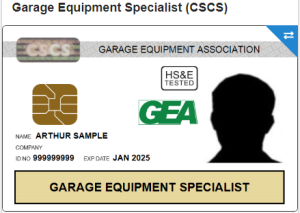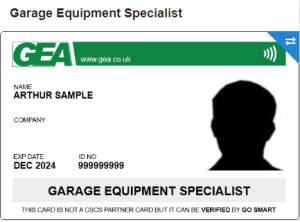
What is a GEA Accredited Engineer?
GEA Garage Equipment Specialist Card
Upon completion of a GEA assessment, the engineer will be issued with a GEA Garage Equipment Specialist card which will hold the details of the engineer’s GEA completed assessments. The card can be issued in virtual and/or physical format. A virtual card is free of charge and can be accessed via the Vircarda app. A physical card is charged at an additional £20.00 + VAT and will be posted to the members office address.
CSCS card (Construction Skills Certification Scheme) – a CSCS card can be issued if the engineer has a valid CITB Health & Safety certificate with at least 6 months remaining before expiry. If this is required, please select the relevant option when booking the assessment. This is charged at an additional £50.00 + VAT.


| ASSESSMENT NAME | ONLINE TRAINING PORTAL | CLASSROOM BASED | ASSESSMENT PRICE EXC. VAT | VIRTUAL CARD | PHYSICAL CARD EXC. VAT | CSCS CARD EXC. VAT |
|---|---|---|---|---|---|---|
| Lift Engineer | Yes | Available upon request | £130.00 | FOC | £20.00 | £50.00 |
| MOT Equipment Engineer | Yes | Available upon request | £130.00 | FOC | £20.00 | £50.00 |
| Sales Consultant | Yes | Available upon request | £130.00 | FOC | £20.00 | £50.00 |
| Wire Rope Inspector | No | Yes at GEA head office, Daventry. Other locations available upon request | £225.00 | FOC | £20.00 | £50.00 |
*Assessments must be completed within 6 months from the date of booking. Beyond this date will incur suspension and an administration fee charged for release*.
**Assessments are valid for three years from the date of completion (to the end of the month), by which time the assessment will need to be retaken**.
This GEA Engineer Assessment measures the knowledge of engineers who service, install and calibrate non emission MOT equipment. We believe that such engineers should have an in-depth knowledge of the DVSA regulations, guidelines and calibration requirements.
It’s this knowledge, together with the appropriate product training that creates a competent engineer.
The MOT Assessment can be completed either online, at the GEA, or we can attend your site to complete the assessment (additional travel costs may be incurred).
This tough Assessment consists of multiple choice questions, the correct answers can be found by studying the relevant documents and we will also require to review your product training records from your employer / supplier to ensure you have the required technical skills / competencies.
The pass rate is set at 70%.
Please note: It’s essential that engineers study the following documents before sitting the assessment:
The MOT Testing Guide, Section D “Requirements for Authorisation”
The MOT Testing Guide, appendix 2 “Facilities and Security”
The MOT Testing Guide can be found at: https://www.gov.uk/topic/mot/manuals
The Assessment will also seek knowledge on general Health and Safety subjects, such as working at height, correct lifting and body protection. Some assessment questions will relate to DVSA MOT Equipment Specifications, which can also be found in the public area of the Technical Library on the GEA website.
The GEA believes that a good understanding of the specific UK’s Regulations together with good product knowledge makes for a competent Lift Engineer.
Technical training on products is to be provided by the member company or an equipment OEM supplier, as many products can be specific to them.
The assessment of an engineer’s technical knowledge / competency needs to be assessed / confirmed by the member company before they are able to site the GEA assessment.
The GEA is, however, in a good position to independently assess an engineer’s knowledge / understanding of UK rules and regulations. To do this, the GEA has developed the GEA Vehicle Lift Engineer Assessment. The assessment tests an engineer’s knowledge of LOLER and PUWER, which are the two main HSE regulations that a garage must abide by. We also check the engineers knowledge of BS 7980, (Vehicle lift installation, maintenance and safe use) and ask a few questions on the vehicle lift manufacturing / certification standard EN 1493.
This tough Assessment consists of multiple choice questions; the correct answers for which can be found by studying the following documents.
Please Note: It’s essential that engineers studies these documents before attempting the assessment: the documents are made available to the engineer on completed bookings.
BS 7980:2012 Vehicle lifts. Installation, maintenance, thorough examination and safe use
BS EN 1493:2010. Vehicle lifts
LOLER: The lifting operations and lifting equipment regulations 1998
PUWER: Providing and using work equipment
The GEA believes that a good understanding of the UK’s MOT Regulations together with good product knowledge makes for a competent Sales Consultant. This assessment is not on specific product features and benefits but on UK MOT bay regulations and generic Health & Safety requirements, including regulations around vehicle lifts.
The GEA Sales Consultant assessment covers DVSA specifications, Health and Safety and Vehicle lift regulations.
Please Note: It’s advised that sales consultants study these documents before sitting the assessment:
The MOT Testing Guide, Section D “Requirements for Authorisation”
The MOT Testing Guide, appendix 2 “Facilities and Security”
The MOT Testing Guide can be found at: https://www.gov.uk/topic/mot/manuals
The assessment also measures a Sales Consultant’s knowledge of LOLER and PUWER, which are the two employment regulations that a garage owner must abide by when setting up an MOT bay. We also check knowledge of BS 7980, which has become the lift installation company’s bible, and ask a few questions on the vehicle lift manufacturer’s standard EN 1493.
BS 7980:2012 Vehicle lifts. Installation, maintenance, thorough examination and safe use
BS EN 1493:2010. Vehicle lifts
LOLER: The lifting operations and lifting equipment regulations 1998
PUWER: Providing and using work equipment
Some assessment questions will relate to DVSA specific MOT Equipment Specifications, these can also be found in the public area of the GEA website’s Technical Library.
A Wire Rope Inspector is defined as a person who is responsible for the inspection and certification of wire ropes as used in Vehicle lifts.
The purpose of this course is to supply guidance to engineers and competent persons on wire rope construction, examination, identification of potential weakness and removal from service if required.
The course is held at the GEA office in Daventry.
Hours: 10:00am – 15:00pm, which includes a buffet lunch and refreshments.
Upcoming course dates:
12th September 2024 (Spaces available)